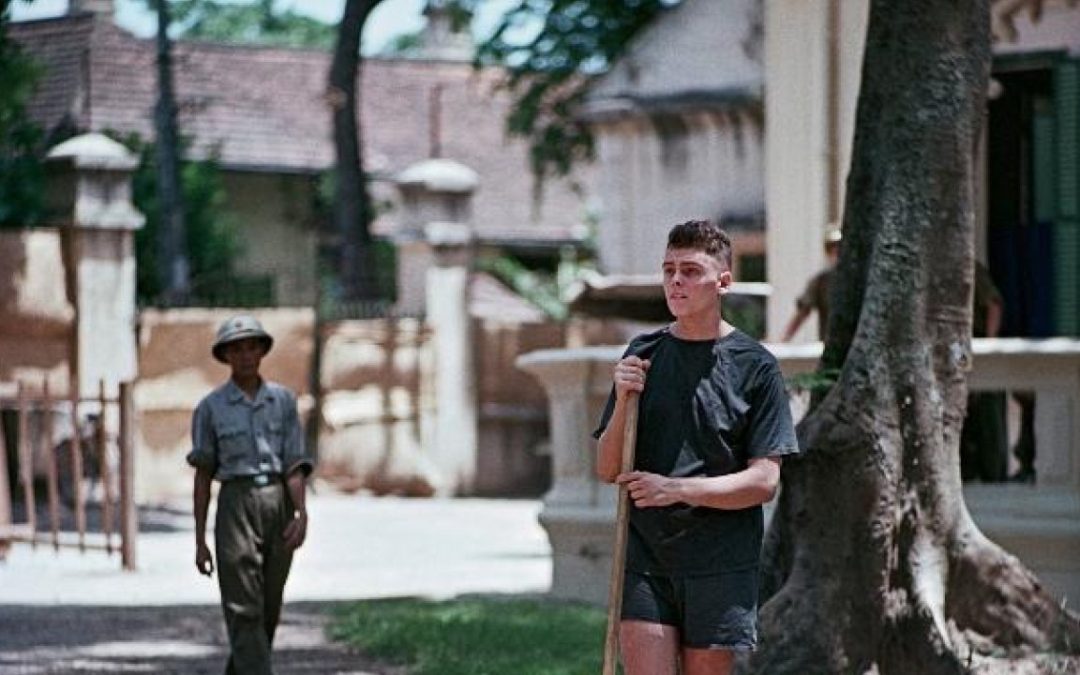“You don’t have to be a hero to accomplish great things. You can just be an ordinary chap, sufficiently motivated to reach challenging goals.” Edmund Hillary
April 6, 1967 – Gulf of Tonkin – North Vietnam: Doug Hegdahl went up on the deck of the U.S.S. Canberra to get some fresh air before his 0400 shift in the ammunition room. Not realizing the ship was beginning a shelling mission of the North Vietnam coast, the concussion from an 8-inch gun flipped the 20-year-old Navy petty officer overboard.
Hegdahl watched in shock as his ship went out of sight in the darkness. None of the 1,150 sailors on board realized that he was in the water. He had neither a life jacket nor identification. Ignoring his slim chance of survival, he followed the instructions from water survival school, removed his boots, and inflated his trousers into a life preserver.
Hegdahl, the son of Norwegian immigrants, had grown up on a farm in Clark, South Dakota, population 1,200. He was an excellent student and a good athlete, starring on his high school football team. The day after high school graduation, he joined the Navy. After training, Hegdahl became an ammunition handler on the Canberra and headed to Vietnam during the height of the war.
After Hegdahl went overboard, his shipmates assumed that he was hiding somewhere in the ship and did not report him missing for two days. The ship’s captain assumed that he drowned, declared him lost at sea, and held a memorial service.
After Hegdahl was blown overboard, he floated and treaded water for 12 hours before being rescued by Vietnamese fishermen. Two days later, he was handed over to the authorities. Hegdahl was taken to the notorious Hoa La “Hanoi Hilton” Prison. After guards beat him unconscious with their rifle butts, he was interrogated.
Hegdahl informed his captors that he was a Navy petty officer raised on a farm in South Dakota. “So, you are a peasant?” asked his interrogator. “Yes, I am a peasant,” nodded the sailor. “How many water buffalo does your father own?” the questioning continued. “He doesn’t own any,” said Hegdahl. “So, you are a poor peasant?” the interrogator asked. The petty officer nodded. From that day on, the youngest and most junior U.S. officer in the prison took on the role of a poor illiterate peasant who could neither read nor write.
Over time, the prison guards called Hegdahl “Ngu nhur bo” (The Incredibly Stupid One). Because he was considered too dumb to do any harm, the guards allowed him out of his cell every afternoon to sweep the grounds while they took a two-hour siesta. It was a time for Hegdahl to gather critical military information from POWs.
After listening in amazement as the petty officer recited the Gettysburg Address both forward and backward, Hegdahl’s first POW roommate, Lt. Joe Crecca, taught him a simple system for memorizing the names of POWs at the Hanoi Hilton.
Hegdahl eventually memorized, in alphabetical order, the names, branch of service, and rank of all 256 POWs. He used the classic children’s song Old McDonald to associate names with animals.
The U.S. had tried repeatedly to attain the names of the American prisoners held by the North Vietnamese, but Hanoi was uncooperative. Then, on August 4, 1969, the North Vietnamese, in an act of goodwill, released Doug Hegdahl and 11 other prisoners.
The ruse was over. The North Vietnamese had been duped by the photographic memory of 22-year-old Doug Hegdahl. The petty officer released the names of all prisoners at the Hanoi Hilton, including top-ranking officers like Lt. Commander John McCain, Vice Admiral James Stockdale, and Lt. Commander Dick Stratton.
Hegdahl also testified to the horrible living conditions in the prison, which violated the Geneva Convention guidelines for the treatment of prisoners. He shared information about the torturing of senior officers, about how men were placed in cages, hung from the ceiling by their hands, or spent months in solitary confinement in rat-infested cells. Hegdahl was flown to the Paris Peace Talks, where he confronted representatives from North Vietnam.
The treatment of POWs and living conditions at the Hanoi Hilton improved within days of Hegdahl’s release. Lt. Commander Dick Stratton later spoke on the behalf of all POWs, “Thanks to Doug Hegdahl. Because of his bravery, cunning, and creativity, the Communists had to produce us alive and in good condition at the end of the war. He saved our lives. The ‘Incredibly Stupid One’ will always be our hero.”
Doug Hegdahl spent the remainder of his Navy career teaching at the U.S. Navy Survival, Evasion, and Escape School at Naval Base Coronado in San Diego. Today, the retired 78-year-old can still recite the name, rank, and service of all 256 POWs.

Amazing story. Thank you Pete.
Great story. Strange events can sometimes happen for a good reason. John McCain would return to the U.S. and complete his Naval Career at Cecil Field, Jacksonville, Fl. Former Major of Mobile, Sam Jones would work directly for McCain. I arrived at Cecil shortly after they transferred out.